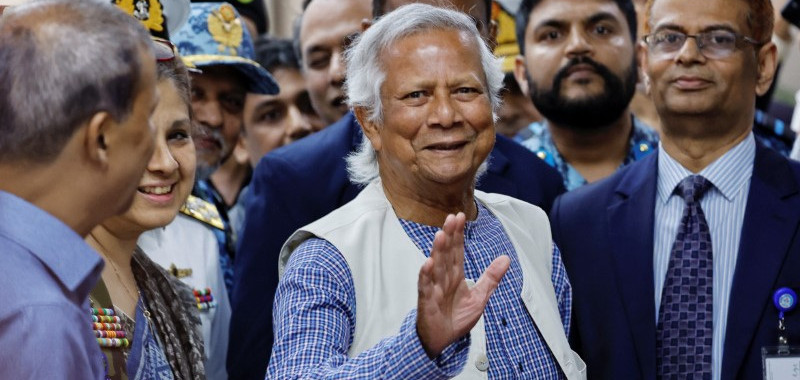Nobel laureate Yunus takes charge of Bangladesh, hopes to heal strife-torn country
- News Agency
- Aug 9, 2024
- 3 min read

DHAKA - Nobel Peace laureate Muhammad Yunus took charge of Bangladesh's caretaker government on Thursday, hoping to help heal the country that was convulsed by weeks of violence, forcing Prime Minister Sheikh Hasina to quit and flee to neighbouring India.
Known as the "banker to the poor", Yunus is the pioneer of the global microcredit movement. The Grameen Bank he founded won the 2006 Nobel Peace Prize for helping lift millions from poverty by providing tiny loans to the rural poor who are too impoverished to gain attention from traditional banks.
As chief adviser of the caretaker government, he is, however, tasked with bringing stability back to the country which witnessed some of its worst violence in decades and then hold fresh parliamentary elections.
"The brutal, autocratic regime is gone," Yunus said in a televised address to the nation after taking charge. "Tomorrow, with the rising sun, democracy, justice, human rights, and full freedom of fearless expression will be enjoyed by all, regardless of party affiliation. That is our goal."
Earlier on Thursday, on his arrival in Dhaka following medical treatment in Paris, Yunus said he would govern it with the guidance of students who backed him for the role in the caretaker government.
A harsh critic of Hasina, Yunus became emotional and seemed to hold his tears back at the airport as he referred to a student he said had been shot during the protests and that sacrifice could not be forgotten.
Hasina's flight from the country she ruled for 20 of the last 30 years after winning a fourth term in January triggered jubilation and violence as crowds stormed and ransacked her official residence.
Many Hindu homes, temples and businesses were vandalised after Hasina's departure, and hundreds in the minority community have tried unsuccessfully to flee to India this week. The Bangladesh Hindu Buddhist Christian Unity Council said a schoolteacher was killed and 45 other people hurt.
Many Hindus have traditionally supported Hasina's Awami League party, which identifies as secular.
POWER VACUUM
Yunus' swearing-in plugged the power vacuum in the South Asian country of 170 million people with the fourth-largest Muslim population in the world, created after Hasina resigned and flew to India on Monday.
President Mohammed Shahabuddin administered the oath of office to Yunus and 13 advisers who will help him govern, at a brief ceremony in the official presidential residence.
Three more advisers will be sworn in at a later date, officials said. Nahid Islam and Asif Mahmud, two student leaders who are both in their mid-20s and led the protests, were among the 13 who joined the caretaker government.
The ceremony started with a minute's silence to honour the hundreds who were killed in the protests and clashes that erupted in July.
The army played a critical role towards the end of the crisis, conveying to Hasina that troops would not open fire on civilians to enforce a curfew declared on Sunday, sealing her fate, Reuters reported.
Hasina's Awami League party does not figure in the interim government. In a Facebook post, her son Sajeeb Wazed Joy said the party had not given up, and was ready to hold talks with opponents and the interim government.
The main opposition Bangladesh Nationalist Party (BNP) boycotted two national elections after the arrest of its leaders and has demanded fresh elections in three months.
PROTECT HINDUS, INDIA URGES
Hasina is sheltering in the New Delhi area, a development that Yunus said caused anger at India among some Bangladeshis. India's foreign ministry said it had no update on Hasina's travel plans and it was up to her to "take things forward".
The neighbours have longstanding cultural and business ties and New Delhi played a key role in the 1971 war with Pakistan which led to the creation of Bangladesh.
India's Prime Minister Narendra Modi congratulated Yunus and said New Delhi was committed to working with Dhaka to fulfil the "shared aspirations" of the people of both countries for "peace, security and development".
"We hope for an early return to normalcy, ensuring the safety and protection of Hindus and all other minority communities," he said.
The student-led movement that ousted Hasina grew out of protests against quotas in government jobs that spiralled in July, provoking a violent crackdown that drew global criticism, though the government denied using excessive force.
The protests were fuelled also by harsh economic conditions and political repression. The COVID-19 pandemic damaged the $450 billion economy after years of strong growth, leading to high inflation, unemployment and shrinking reserves.
It pushed the Hasina government to seek a $4.7 billion loan from the International Monetary Fund.

















.png)








Comments